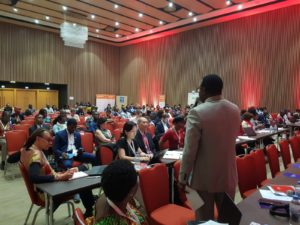 The Civil Society Engagement Mechanism for UHC2030 (CSEM) was active at the Africa Health Agenda International Conference (AHAIC), held in Kigali from March 5-7, 2019. Amref Health Africa convened the conference under the theme 2030 Now: Multi-Sectoral Action to Achieve Universal Health Coverage in Africa. CSEM Advisory Group members Brian Atuhaire, Justin Koonin, Rachel Ndirangu and Itai Rusike led and participated in key conversations, including four CSEM co-led events.
The Civil Society Engagement Mechanism for UHC2030 (CSEM) was active at the Africa Health Agenda International Conference (AHAIC), held in Kigali from March 5-7, 2019. Amref Health Africa convened the conference under the theme 2030 Now: Multi-Sectoral Action to Achieve Universal Health Coverage in Africa. CSEM Advisory Group members Brian Atuhaire, Justin Koonin, Rachel Ndirangu and Itai Rusike led and participated in key conversations, including four CSEM co-led events.
A CSO dialogue in making UHC a reality in Africa: UHC Roadmap
CSEM Advisory Group Member Itai Rusike represented the CSEM at the CSO pre-conference event ‘A CSO dialogue in making UHC a reality in Africa: UHC Roadmap’ at Marasa-Umubano Hotel on March 1-2, 2019. This event was co-organized by UNAIDS, Global Fund Advocates Network, Africa Health Foundation Rwanda and other partners, to discuss the challenges and opportunities to realizing Universal Health Coverage (UHC) in Africa. Advisory Group member Rusike made a presentation on the key opportunities for UHC advocacy.
Dialogue on Country-level UN HLM on UHC Advocacy Meetings
The CSEM is working with World Health Organization (WHO), International Federation of Red Cross and Red Crescent Societies (IFRC) and UNAIDS to organize country advocacy meetings ahead of the High-Level Meeting (HLM) on Universal Health Coverage (UHC). These meetings, to be held in Cameroon, South Africa, Ghana, Central African Republic, Kenya, Afghanistan, Kazakhstan, Pakistan, Philippines, India, Georgia, Argentina, Brazil, and Panama, will provide civil society with a national level platform to advocate for an effective high-level meeting. On March 6, the partners convened a meeting with civil society representing Southern, East, West and Central Africa, to discuss and receive feedback on the proposed meetings, prospective participants, and critical success factors. In their recommendations, participants emphasized the following six main points for the meetings to be a success:
- Ensure government and communities participate
- Ensure the meetings are open to all
- Provide adaptable HLM communications and advocacy materials
- Ensure participants have baseline information on UHC in their country
- Encourage those countries not selected to approach donors for resources
- Aim to begin the meetings as soon as possible to have an impact for the HLM.
Civil Society Consultation on the UN High-Level Meeting on Universal Health Coverage
The UNGA has tasked the International Health Partnership for UHC2030 (UHC2030) with supporting the preparatory process for the HLM on UHC, particularly regarding sharing evidence and good practices, challenges and lessons learned. The CSEM is engaging with UHC2030 in this process. As such, the CSEM, UNAIDs, and IFRC co-hosted a civil society consultation to gather inputs from participants to shape the outcome of the HLM. At this meeting, participants agreed on the following four priorities actions for the HLM: (1) engage civil society and community in the UHC process to ensure accountability, (2) reach first those left behind as committed to in the Sustainable Development Goals, (3) increase public health financing, and (4) focus on health workers/growth of the health workforce. Seventy percent of the meeting participants represented the global South and 30% the North. Of those who participated from the global south about 50% came from East Africa; 30% Southern Africa; 15% West Africa and 5% Central Africa.
A Storytelling Event by African and International Civil Society
On March 7, CSEM, Health Systems Advocacy Partnership and Amref Flying Doctors hosted ‘A Storytelling Event by African and International Civil Society: Dialogues to Accelerate the UHC Agenda at Local, National, Regional and Global Level.’ At the event, five speakers shared inspiring and personal stories of community health work and advocacy from across the African continent. The stories all centered on the theme of achievements and challenges on the road to UHC. A key message from the session was the need to translate global discussions around UHC and health system strengthening for the local and community levels.

